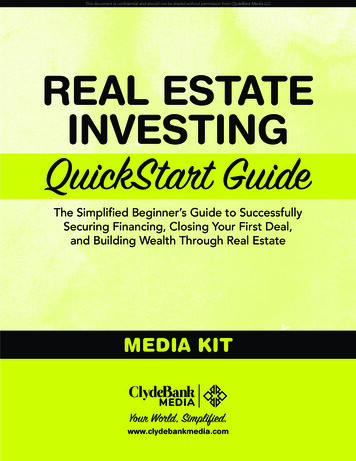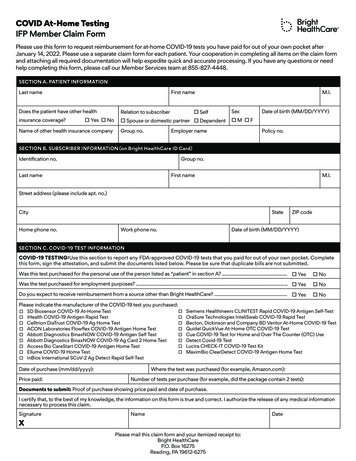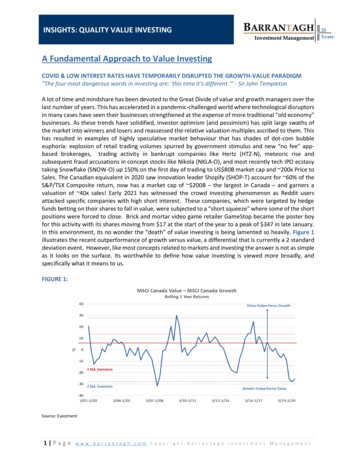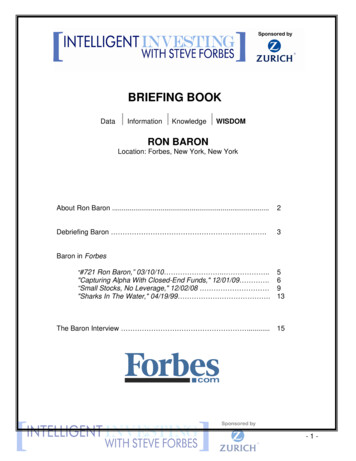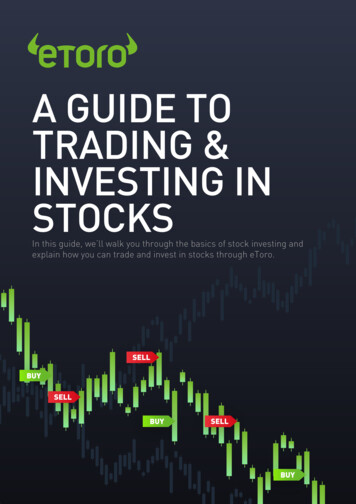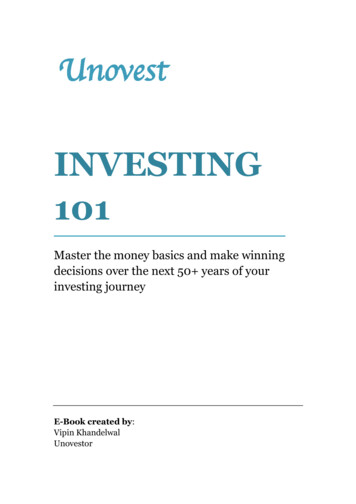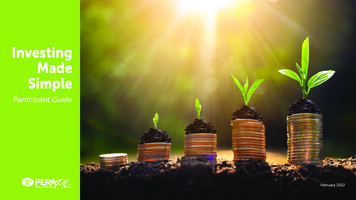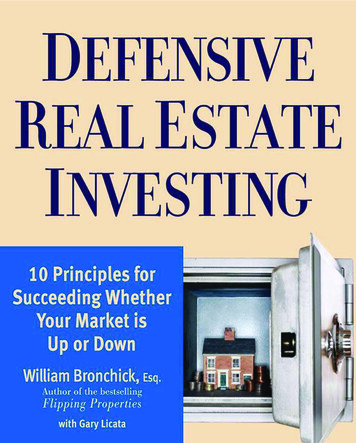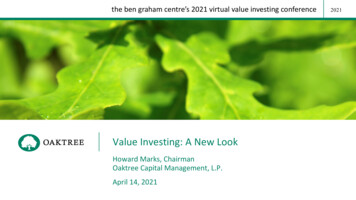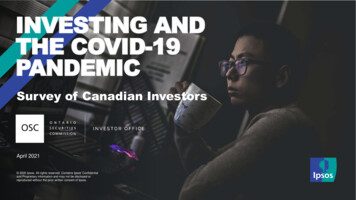
Transcription
INVESTING ANDTHE COVID-19PANDEMICSurvey of Canadian InvestorsApril 2021 2020 Ipsos. All rights reserved. Contains Ipsos' Confidentialand Proprietary information and may not be disclosed orreproduced without the prior written consent of Ipsos.
CONTENTS1.Executive Summary3Objectives and MethodologyKey Findings2.Financial Preparedness103.Financial Goals144.Financial Commitments205.Financial Attitudes and Beliefs256.The Effects of Market Volatility377.Investment Scams508.Financial Knowledge529.Appendix562 ‒ Ipsos
EXECUTIVESUMMARYObjectives and MethodologyKey Findings3 ‒ Ipsos
Research ObjectivesThe Ontario Securities Commission’s (OSC) is closely monitoring the impact of theCOVID-19 pandemic on retail investors and commissioned Ipsos to conduct an onlinesurvey among Canadian investors.The purpose of the survey was to gain a better understanding of the how the pandemicis affecting the preferences, beliefs, attitudes, and financial situation of Canadianinvestors.The survey addressed several topics including: Financial preparedness Financial goals and commitments Buying and selling behaviour during COVID-19 Attitudes towards investing and risk Beliefs about personal wealth and the economy Financial literacy Investment profileA large survey sample was sought in order to have the ability to analyze sub-groups ofthe Canadian investor population.4 ‒ Ipsos
Survey MethodologyOnline survey among 2,000 Canadian investorsRespondents qualified if they have at least one investment product eitherinside or outside of an RRSP, RESP, RRIF, or TFSA. See Appendix for list ofinvestment products.Fieldwork from September 25 to October 5, 2020Weighted by gender, age, region, and household income toreflect the composition of Canadian investorsResults are accurate to within 2.5 percentage points of what theresults would have been had every Canadian investor beenpolled. Credibility intervals will be wider among subgroups of thesample.For more information on Ipsos’s use of credibility intervals, pleaseconsult the following document.5 ‒ Ipsos
Key Findings (1/4)Canadian investors are not financially prepared for emergenciesThree in ten (31%) Canadian investors said they would be unable to afford an unexpected expense of 5,000 within their current cash flow (i.e., by using the money in their bank accounts or using a credit cardand paying the balance in full). Among those who would turn to selling assets or borrowing in order tomeet this expense, most would turn to a bank loan or line of credit, withdraw from their investmentaccount, or carry a balance on their credit card. Nearly one in ten Canadian investors reported havingfaced an unexpected expense of 5,000 or more due to COVID-19, and another one in ten expected toface it if the pandemic were to continue until April 2021.Two in ten Canadian investors were worried about their ability to pay their monthly expenses. Relatedly,one in ten Canadian investors had either already sold some investments to cover their monthly expense(4%) or were considering doing so (8%).Half of Canadian investors stopped contributing to a savings goal.Nearly half (45%) of Canadian investors who were putting money towards a financial or personal goal(ranging from travel/vacation to retirement) stopped contributing toward their goal(s) during COVID-19.This represents about 35% of all Canadians.Savings for travel and large purchases such as an automobile were hit hardest (51% of those saving fortravel have stopped and 37% of those saving for a large purchase have stopped), but more concerningly,one-third stopped saving for their education (35%) or for a house (30%). However, over 8 in 10 of thosesaving towards goals like their children’s education or retirement continued to make progress towardsthese goals.6 ‒ Ipsos
Key Findings (2/4)Most Canadian investors are pessimistic about prospects for the economy.Half (53%) of investors believe the COVID-19 pandemic will have a negative effect on the Canadianeconomy that will past March 2022 (pessimists), while nearly four in ten (37%) thought the negative effectswill not last that long (optimists).Pessimists are preparing for longer-term disruption, focused on cutting back on spending and are morelikely to be ‘passive investors’ during the pandemic, meaning that they have neither bought nor sold.Optimists are more likely to be confident that things will turn around quickly for both the country andthemselves and to be active in buying/selling, seeing the pandemic as an opportunity to invest.Half of Canadian investors have been ‘active’ in terms of investingduring COVID-19.While half (52%) of Canadian investors have been passive investors during the pandemic, the other half(48%) can be classified as being ‘active investors’, meaning that they bought and/or sold investmentsduring this time.Two in ten (22%) investors sold at least some of their investments during the pandemic (half of whom sold20% or less of their total portfolio) and were motivated by three primary reasons: to pay for expenses (29%),minimize losses (21%), and to realize profits (17%).Four in ten (40%) Canadian investors bought investments during the pandemic (most bought 20% or less oftheir portfolio). The majority (70%) of which were reacting to the market, as opposed to sticking to theirregular contribution patterns (30%), motivated primarily by a belief that assets were undervalued (28%).7 ‒ Ipsos
Key Findings (3/4)Among active investors, most saw an opportunity to grow their portfolio;however, those who sold did so because they needed the money.Active investors, who were buying and selling during the pandemic, can be further dissected into ‘netbuyers’, ‘net sellers’ and ‘net zero’ investors.Net Buyer30% Net ZeroNet Seller12%In general, active investors were more likely to be male, younger, have children in the household, andhave higher household incomes. They were motivated to invest in part by a more optimistic outlook for theeconomy, but also to address their immediate financial needs. Active investors were generally more likelyto feel their financial situation is worse off than a year ago (September 2019). This was particularly true fornet sellers, who were in a selling position to cover expenses.Net buyers, on the other hand, were more likely than both passive investors and net sellers to say theirfinancial situation is better.Passive investors were more likely to say their financial situation has been unaffected by the pandemic buthave not yet invested, the reason for which can be at least partially attributed to pessimism over the stateof the economy.8 ‒ Ipsos
Key Findings (4/4)Higher investment stress tends toward selling, while lower stress tendstoward buyingThree in ten investors have become more stressed about their investments during the pandemic. Thoseage 35-54 were disproportionately affected, with this group comprising half (49%) of those who describetheir stress level as “high” or “very high”. Highly-stressed investors were more likely to be net sellers (28% vs.18% net buyers), while less-stressed investors were more likely to be net buyers (31% vs. 5% net sellers).Highly stressed investors were 10 times more likely to have been approached with an investmentopportunity promising high returns with low risk due to COVID-19 (however, they were no more likely tohave responded to the opportunity).Almost half of Canadian investors have high financial knowledge;However, even these investors still want a better understanding of theirfinancial situation.At least seven in ten answered correctly to a given financial knowledge question and nearly half were ableto correctly answer all three questions. Knowledge was consistently higher among older investors, men,those with more education, those with more than 500k in investments, and those who have been activeinvestors.Interestingly, the data does not appear to show a connection between investors’ level of financialknowledge and the degree to which they were satisfied with their level of understanding of their financialsituation. Despite having a good understanding of the fundamentals, high-knowledge investors are as likelyas those with less knowledge to say they need a better understanding of their financial situation (45% vs.49%).9 ‒ Ipsos
FINANCIALPREPAREDNESS10 ‒ Ipsos
FINANCIAL PREPAREDNESS Three in ten (31%) Canadian investors reported that they would not be able to affordan unexpected expense of 5,000 within their current cash flow (i.e., using the cash intheir bank accounts and/or using a credit card whose balance would be paid in fullat the end of the month). Men and older Canadians were more likely to say thatthey could meet this expense.The most common ways in which Canadian investors without sufficient cash said theywould meet this expense were putting in on their credit card, using a bank loan, orwithdrawing funds from an investment account.Interestingly, there was no difference among households of different income levelsregarding their ability to pay for the unexpected expense. Furthermore, those withkids in the household were less likely to say they could cover the expense with justtheir existing cash flow (26% v. 33% for those without children).Households with kids and those under 55 years are more likely to have had anunexpected expense of 5,000 because of the pandemic. More than one in tenwithin each of these groups has already had to deal with such an expense.11 ‒ Ipsos
Preparedness to Manage Unexpected ExpensesSeven in ten (69%) Canadian investors said that they would be able to pay for an unexpected expense of 5,000 within their current cash flow (i.e.,using the current money in their checking/savings account and/or put on a credit card with the balance fully paid at the end of the month). Menwere more likely to say that they could meet the expense without taking on additional debt (72% v. 66%), as were older Canadians (78% among 55 years, 59% among 35-54 years. 65% among 18-34 years).As for the remaining 31% who would have to take on some kind of debt, substantial minorities would incur additional costs/losses in covering theemergency through means such as accessing their line of credit or a bank loan, withdrawing funds from investments, or incurring credit card debt.52%With the money currently in my checking/savings account or with cash30%Put it on my credit card and pay it off entirely at the end of the month19%Using money from a bank loan or line of credit (including HELOC)By withdrawing funds from an investment account such as RRSP, TFSA,LIRA, RRIF, non-registered investment account or pension plan17%12%Put it on my credit card and make monthly payments on the debt7%By selling something6%By borrowing from a friend or family memberUsing a payday loan, deposit advance, or overdraftI wouldn’t be able to pay for the expense right now2%4%Q6. Suppose that an emergency causes unexpected expenses of 5,000. Based on your current financial situation, how would you pay for these expenses? Please select all that apply.Base: All respondents (n 2001)12 ‒ Ipsos69%only using current account and/orcredit card (paid off at end of month)
Likelihood to Experience Unexpected ExpensesNot yetYes9%8%No83%Nearly one in ten Canadian investors reported having facedan unexpected expense of 5,000 or more due to COVID-19,and another one in ten expected it to happen if thepandemic were to continue until April 2021. With little sign ofthe pandemic abating in the immediate future, almost 2 in 10(17%) of Canadians could find themselves with a largeunexpected expense by early summer 2021.The impact was greater among those under 55 years (12%among 18-34 years, 11% among 35-54 years, 4% among 55 years) and those with kids (13% among those with kids vs. 6%among those without).Q7. Has the COVID-19 pandemic caused unexpected expenses of 5,000 or more? Please select one only.Base: All respondents (n 2001)13 ‒ Ipsos
FINANCIALGOALS14 ‒ Ipsos
FINANCIAL GOALSNearly half (45%) of Canadian investors who were saving money for a financial or personal goal(ranging from travel to retirement) have stopped contributing towards these goals during COVID-19.This represents about 35% of all Canadians.Savings for travel and large purchases, such as an automobile, were hit the hardest (51% of thosesaving for travel have stopped and 37% of those saving for a large purchase have stopped), but moreconcerningly, one-third have stopped saving for their education (35%) or for a house (30%). However,over 8 in 10 of those saving towards goals like their children’s education or retirement have continuedto make progress towards these goals.Lower-income households have been the hardest hit (with 58% having stopped saving).Understandably, worries about one’s monthly expenses weighed heavily on the decision to stop saving.For instance, those who have stopped saving were twice as likely to be worried about their currentability to pay their monthly expenses than those who continued saving (34% vs.15%).Knowledge of one’s personal financial situation also appears to have played a role in these savingsbehaviours. Those who have continued saving indicated a better understanding of their financialsituation (24% ‘strongly disagree’ that they need a better understanding of my financial situation vs.17% among those who stopped saving).Interestingly, those who stopped saving were more inclined to believe their finances will be impactedby COVID-19 until at least October 2021 to March 2022 than those who continued saving (31% vs. 22%).Furthermore, those who are continuing to save were more likely to be unsure than those who stoppedsaving about when they will no longer be impacted by COVID-19 (32% vs. 19%).15 ‒ Ipsos
Canadians’ Savings GoalsPrior to COVID-19, eight in ten (79%) Canadian investors were contributing to at least one savings goal, a proportion that was as high as 91%among those under 55 years. Most investors were saving for retirement, followed by travel, pre-retirement income, and large purchasessuch as an automobile. More women than men reported having a savings goal prior to COVID-19 (84% vs. 75%).YesRetirement53%Travel8%Other4%Q8. Prior to COVID-19, were you making contributions to any of these savings goals?Base: All respondents (n 2001)10%48%18%Your own education16%65%20%Down payment on a house8%51%24%Your child/children's education11%47%34%Large purchase such as an automobileNot applicable36%45%To provide regular income before I retire16 ‒ IpsosNo32%60%22%66%21%25%23%
Savings Goals Stopped Due to the COVID-19 PandemicDuring COVID-19, nearly half of investors (45%) stopped contributing to a savings goal, with travel being the goal for which the most people havestopped saving. Substantial proportions also stopped saving for things such as their own education or a large purchase such as an automobile. Evenmore concerning, nearly one in three stopped saving for a down payment on a house, one-quarter for pre-retirement income, and two in ten forretirement or their children’s education.More women than men have stopped saving towards their goals in general (49% vs. 41%). Furthermore, lower income households were more likely tohave stopped saving (58% with household income 50K). This is understandable, given the uneven impact the pandemic has had on women andlower earning more modest incomes.Continued savingStopped savingYour child/children's education20%80%Retirement20%80%To provide regular income before I retireDown payment on a house26%30%63%51%Travel23%Q9. Have you continued to make contributions to these savings goals during the COVID-19 pandemic?Base: Those who were making contributions to savings goals pre-pandemic (n varies)17 ‒ Ipsoscontinue to savefor all their goals65%37%Large purchase such as an automobile55%70%35%Your own educationOther74%49%77%
Saving for Children’s EducationFocusing more specifically on those with children under 18 years of age in the household, seven in ten (69%) said that they were saving for theirchild/children’s education pre-pandemic. Eight months into the pandemic (as of end of September, early October 2020), parents were mostlycontinuing to put money aside for their children’s education; 85% said they are still saving towards this goal in some way.No27%Yes69%Not applicable4%Q8. Prior to COVID-19, were you making contributions to any of these savings goals?Base: Those with children under 18 years in the household (n 359)Q9. Have you continued to make contributions to these savings goals during the COVID-19 pandemic?Base: Those with children under 18 years in the household who were saving for their children’s education pre-pandemic (n 235)18 ‒ Ipsos85%continue to save for theirchildren’s education
Saving for RetirementAs for saving for retirement, half (53%) of Canadian investors say that they were saving for this goal pre-pandemic. This proportion was much higheramong those of prime working age: 35-54 years (71%). Of those originally saving for retirement, 8 in 10 said they have continued to makecontributions to this goal. While there was not much difference in terms of age among those who have continued to save, those earning 50k orless were more likely to say they’ve stopped making contributions to this goal during the pandemic.No36%Not applicableYes53%58% 18-34 years71%: 35-54 years38%: 55 years11%Q8. Prior to COVID-19, were you making contributions to any of these savings goals?Base: All respondents (n 2001)Q9. Have you continued to make contributions to these savings goals during the COVID-19 pandemic?Base: Those who were saving for retirement pre-pandemic (n 1029)19 ‒ Ipsos80%continue to savefor their retirement65%: HH income 50k79% HH income 50- 100k86%: HH income 100- 200k100%: HH income 200k
FINANCIALCOMMITMENTS20 ‒ Ipsos
FINANCIAL COMMITMENTS Three in ten (32%) Canadian investors said their current financial situation is worse than itwas in September 2019, twice the number who said that their current financial situation isbetter than it was in September 2019 (16%).Two in ten Canadian investors said they were worried about their ability to pay theirmonthly expenses.One in ten (12%) Canadian investors have either already sold some investments to covertheir monthly expense (4%) or are considering doing so (8%).Half of Canadian investors said they believe the COVID-19 pandemic will have anegative effect on the Canadian economy that will last past March 2022. Three in ten(29%) said they think the impact will last until August 2021 to April 2022. Only 9% believedthe Canadian economy will be impacted until October 2021 or less.Four in ten (42%) Canadian investors felt it will take at least until October 2021, if notlonger, for their household to get back to the same financial position before COVID-19,and an additional 4% said they think they’ll never get back there.21 ‒ Ipsos
Impact of COVID-19 Pandemic On Financial SituationsThree in ten (32%) Canadian investors said their current financial situation is worse than it was in September 2019, twice thenumber who said that their current financial situation is better than in September 2019 (16%).While there was no statistically significant difference among income groups when it comes to who says they are better off now,those in households earning less than 50,000 a year were a little more likely to say they are worse off, thereby giving further cluesas to the extent to which the pandemic has disproportionately affected those with lower incomes (alongside other groups).Much worse off7%Somewhat worse off25%About the sameSomewhat better off51%32%Worse off36% among those with HH income 50kQ10.How does your financial situation compare to 12 months ago? much better off, somewhat better off, about the same, somewhat worse off, much worse off, don’t know.Base: All respondents (n 2001)22 ‒ IpsosMuch better off13%3%16%Better off
Worry About Current Monthly ExpensesTwo in ten Canadian investors were worried about their ability to pay their monthly expenses, with Millennial investors slightlymore worried than other age groups about meeting their monthly debt obligations. Women were also more worried whencompared to men (23% vs. 19%).21%Worried about ability to pay bills25%: Gen Z35%: Millennials26%: Gen X9%: BoomersQ11. Are you worried about your current ability to pay your monthly expenses such as food, rent, utilities, credit cards, loan and mortgage payments?Base: All respondents (n 2001)23 ‒ Ipsos
Selling Investments to Cover Monthly ExpensesDon'tknow4%Yes, I am8%I alreadyhave4%About one in ten (12%) Canadian investors have either already soldsome investments to cover their monthly expenses (4%) or areconsidering doing so (8%). More specifically: No, I am notYounger investors were the most likely to consider selling investments (15% among 1834 years, 11% among 35-54 years, 4% among 55 years).Those with kids in the household were twice as likely to consider selling (15% vs. 7%).Those without an investment portfolio manager or advisor were also twice as likely toconsider selling (11% vs. 5%).Leveraged investors (those who borrowed money to buy any of their investmentsduring or before COVID-19) were 7 times more likely to sell to cover their currentmonthly expenses (35% vs. 5%).Those who feel their financial situation is worse than it was in September 2019 were 4-6times more likely to consider selling than those who thought it is better or the same.83%Q12. Are you considering selling some or all of your investments to pay your monthly expenses such as food, rent, utilities, credit cards, loan and mortgage payments?Base: All respondents (n 2001)24 ‒ Ipsos
FINANCIALATTITUDES ANDBELIEFS25 ‒ Ipsos
CHANGING ATTITUDES AND BELIEFSThe pandemic has led many Canadian investors to sit up and pay attention to theirfinancial situation. With many affected by the pandemic in some way through job loss,salary reductions, or lay offs, investors are looking for ways to whether the storm. Canadianinvestors said that as a result of the pandemic, they’d like to start focusing on saving forfuture emergencies (73%), paying off their debt (73%), and watching their overall spending(70%). It has also contributed to a large minority (38%) wishing to have a betterunderstanding of their financial situation.Understandably, one-third of investors said that they have become more stressed abouttheir investments during the pandemic. Those aged 35-54 years were disproportionatelyaffected, with this group comprising half (49%) of those who describe their stress level aseither ‘high’ or ‘very high. Perhaps not surprisingly, investors with fewer investments ( 100K:22%) were the most stressed, while those with the most investments were the least stressed( 500K: 9%).Those having reported a higher level of stress over their investments were more likely tohave sold some investments, while those who reported a lower level of stress were morelikely to have bought investments. This is perhaps a troubling sign of the oft-mentioneduneven recovery – those who are in immediate need of cash to pay expenses end upselling their investments (and end up poorer in the long-run), while those who can afford toweather the storm increase the size of their portfolio (thereby setting themselves up foreven more success later on). As the pandemic drags on, these trends risk being magnified,as more investors may find themselves in need of cash to meet immediate, unexpectedexpenses.26 ‒ Ipsos
How Much Longer COVID-19 Will Impact Personal Finances 3 months5%4-6 months6%7-9 months36%8%Until October 2021 or lessI don't know29%10-12 months17%Canadian investors were split on whether COVID-19will be affecting their financial situation pastOctober 2021, with 36% saying it will affect them upto October 2021 and 35% saying it will affect themfor past October 2021. Three in ten were uncertainas to how long COVID-19 will impact themfinancially. More than 18months21%13-15 months16-18 months9%5%35%Past October 2021Q13. How much longer do you think the COVID-19 pandemic will affect your financial situation?Base: All respondents (n 2001)27 ‒ IpsosYounger investors were most likely to believe theirfinancial situation will be affected for a time period up toOctober 2021.Women were more likely to say they are uncertain as tohow long the pandemic will affect their personalfinances (35% vs. 23% among men). Men were morelikely to offer a estimate – 28% said May-October 2021,38% said November 2021 or longer.
How Long It Will Take Households to RecoverFour in ten (42%) Canadian investors felt it will take at least a year, if not longer, for their household to get back to the samefinancial position as before COVID-19, and an additional 4% thought they’ll never get back there. Only 40% say their financesdidn’t change much and a very small percentage believe they are currently in a better position financially.One year10%Two years15%Three yearsFour years9%2%Five years3%More than five years3%I don't knowI will never be back to where I was financially9%4%My finances didn't change much with COVID-19I am currently better off financially40%6%Q14. When do you think you (and your family living in your household) will be back to where you were financially before the COVID-19 pandemic began? Please select one only.Base: All respondents (n 2001)28 ‒ Ipsos
How Much Longer COVID-19 Will Impact Our Economy8% 3 months 4 to 6 months1%Don't know9%July 2021 or sooner3%37%7 to 9 months4%10 to 12 months11%April 2022 or sooner13 to 15 months6%16 to 18 monthsHalf of Canadian investors believed thatCOVID-19 will have a negative effect on theCanadian economy lasting until April 2022 orlonger. Three in ten (29%) thought that theimpact will last until somewhere betweenAugust 2021 to April 2022. Only 8% believed theCanadian economy will be impacted until July2021 or less. 12%April 2022 or longer53%Q15. How much longer do you think the COVID-19 pandemic will have a negative effect on the Canadian economy?Base: All respondents (n 2001). Those responding “I don’t think the economy has been affected much’ have been excluded from the chart (1%).29 ‒ Ipsos Women were more likely than men to think theCanadian economy will be affected for until April2022 or longer (57% vs. 49%).Perceptions of length increased with age – 55% ofthose 55 years thought it will be until April 2022 orlonger (vs. 53% among 35-54 years and 45% among18-34 years).
How Long It Will Take the Economy to RecoverWhile most Canadian investors agreed it will be at least a year before for the Canadian economy will be as strong as it was beforethe pandemic, investors were quite divided on how much longer it will be. While about half of investors thought it will return to preCOVID strength within five years (October 2025), one in ten (9%) believed that the Canadian economy will never get back towhere it was.Pessimists (those who think the pandemic will have negative impact on the Canadian economy past April 2022) thought it will takemuch longer for the economy to be as strong as it was before the pandemic (50% believed it will take until 2025 or longer vs. 22%of optimists) or that it will never be as strong (13% vs. 2% of optimists).One year3%Two years13%Three years17%Four Years7%Five Years13%More than Five years23%Don't know15%The economy will never be back to where it wasI don't think the economy has been affected muchQ16. When do you think the Canadian economy will be as strong as it was before the pandemic?Base: All respondents (n 2001)30 ‒ Ipsos9%1%
Those Optimistic about How Much Longer the Economy WillBe Impacted More Likely to be Confident and Active InvestorsOptimists, defined as those who believe that the pandemic’s negativeeffects will last until April 2022 or less, were more likely to be: Active in buying/selling, seeing the pandemic as an opportunity toinvest37%Optimistic(Negative effects will lastUntil April 2022 or less) Adopt more risky investment strategies during the pandemicWant to invest more money in the stock marketBe open to buying real estate as an investmentHave sold investments during the pandemicMore likely to be leveraged, having borrowed money to buy investments(either before orduring the pandemic) Confident that things will turn around quickly for both the country andthemselves Believe the Great Financial Crisis of 2007-8 was worse than COVID Think Canadian economy will rebound within 5 years Think their personal financial situation will be affected a year or less and that theirhousehold will be back to where it was financially within 1-2 yearsDemographically, optimists were more likely to be: Male (51% v. 43% for women) Aged between 18-34 years (55% vs. 47% for 35-54 years and 45% for 55 years)31 ‒ IpsosQ15. How much longer do you think the COVID-19 pandemic will have a negative effect on the Canadian economy?Base: All respondents (n 2001)
Pessimists about How Much Longer Our Economy Will BeImpacted Hunkering Down FinanciallyPessimists, defined as those who believe that the pandemic’s negative effects will lastuntil April 2022 or longer, were more likely to be:53% Pessimistic(Negative effects will lastUntil April 2022 or longer) Preparing for longer-term disruption Think their personal financial situation will continue to be affected past April 2022 Think the larger Canadian economy won’t rebound for another 5 or more years (or not at all) Believe that the fall-out from the pandemic will be worse than the Great Financial Crisis of2007-8 Cutting back Want to focus on decreasing their spending Want to invest less money in the stock market Less likely to be leveraged Staying put Have neither bought nor sold investments during the pandemicHave not changed investment strategy during the pandemicLess likely to adopt risky investment strategies during the pandemicHave not sold investments during
With the money currently in my checking/savings account or with cash Put it on my credit card and pay it off entirely at the end of the month Using money from a bank loan or line of credit (including HELOC) By withdrawing funds from an investment account such as RRSP, TFSA, LIRA, RRIF, non-registered investment account or pension plan



